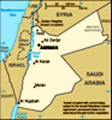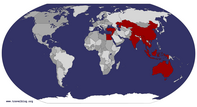Advertisement

 Wadi Araba
Wadi Araba
roman farmhouseIndiana Jones never seemed to spend much time scrubbing toilets. I don’t think he ever even had the pleasure of a roommate who smokes in a room in which you can’t open the windows, although it’s probably fair to say that he didn’t have Internet access either. I mention Indiana Jones for much the same reasons that I mentioned Borat in the blog about Kazakhstan - you’re all thinking about it, and every time I say something about going on an archaeology dig, particularly somewhere so close to Petra, someone says “blah blah Indiana Jones blah blah blah” much like every time I said something about going to Kazakhstan someone said “blah blah Borat blah blah blah”.
So the archaeology “dig” which I’d sort of planned my travels around has finally begun. We received very little information about it before it started, virtually nothing until the week before, partly I think because most of it had still to be arranged. We were expecting to stay in Aqaba, a big tourist town in the very south of Jordan, used by tourists as a launching point to Petra and also popular with Saudis whom I imagine come across to drink alcohol and

 Wadi Araba
Wadi Araba
small bedouin encampment, taken from up the side of a small hill, near where much of our survey work was done in the first weekdo other things which might not be allowed in Saudi. It’s also very close to the Israeli border with an Israeli twin city, and the Egyptian border by ferry across the tip of the Red Sea. Anyway, we didn’t end up staying there.
Instead we got one level of a disused government building in a no-horse town called Al-Risha, or “Risheh” (there seems to be no standard for transliterating Arabic place-names into English, and while all Road signs and suchlike in Jordan are in Arabic and English, the spelling is often strange, with this town, and the next one up by where we’re actually working, being spelt two or three different ways depending on which road sign you look at).
When we arrived we were told not to plug in any electrical appliances or turn on the Air Conditioners as the wiring or fusebox couldn’t handle it. We also discovered that there was virtually no water left. The story was that a tanker had been ordered and had come out a week earlier and filled up the tank but no-one had checked the taps, which had been left open and the tank had promptly drained. The place was

 Rishah
Rishah
sunset from the roof of our house about 40 minutes drive from the survey areaalso quite a mess with the window sills covered in thick piles of sand, and dust coating the walls. The archaeologist spoke with some local guy for ages and worked out that an electrician would come some time the next day, Insha’allah, and a water tank.
So we headed off to Aqaba to sleep in a hotel. When we came back the next day, the electricity was indeed more or less fixed and we had water. We spent the whole day cleaning the place up and assembling our gear. By the end it wasn’t completely covered in dust or grime and we had a functioning place with air conditioners, kitchen, tables, squat toilet and all the modern mod cons.
I don’t have time to write much about the first week, and I’m already way behind and should be writing about the second week, and I don’t want to write too much about people who might read my blog. We have, at least in the first week, a pretty good bunch, only seven volunteers, plus the archaeologist, and one or two local staff. This is a good number as it doesn’t get too clicky. We’re not doing any actual

 Rishah
Rishah
the bustling metropolis of Rishah, seen from the roof of our housedigging this season, mainly survey work, which involves walking around in the desert finding stuff on the surface. The GIS specialist and the archaeologist have satellite photos which they use to pinpoint tracks and possible features and then we go out and look at them. This involves a lot of off-road driving up wadis, in the two “trucks” (as they're called in American, or in Australian that’d be “Utes”) and a lot of walking in the desert. Luckily, hiking and deserts are two of my favourite things, so it’s fine by me.
Much of our first week was walking transacts up a wadi basin. This involves someone with a GPS walking in a straight line (or in one case following an old Roman road) while we space out at 25 metre intervals in either side and walk in unison until someone finds something, then stop and briefly record it. This is fun until you start finding so many stone piles, probably graves, that you get a bit sick of having to stop every five minutes to record another grave. In this wadi we also found a grindstone, and a small cairn marking the Roman Road.
Most days we

 Wadi Araba
Wadi Araba
The Bedouin encampments are remarkably tidy compared to other semi-nomadic indigenous populations, but sometimes you still find random shoes in the middle of nowherebring out a Jordanian worker who is expert at restoration and apparently brilliant at jigsaw puzzles. He’s restoring an old Roman farmhouse which they excavated last year. Each day we can see how much more he’s done and it looks very authentic. There’s a ruined Roman fort, and we also saw a caravan station. The Roman farmhouse is right next to a Bedouin camp, when we arrived on the first day their goats were scrambling all over it, but they moved them for us.
My compact digital camera has broken, so I don’t have many photos for you. We have to carry so much water because you need a lot walking around in the desert in midsummer that I don’t have much space in my daypack for my big Digital SLR. I didn’t take many in week 2 either, but I’ll try to get some for you in week 3, Insha’allah.
While much of the stuff that we’re finding can’t be dated without some serious excavation, a lot of it apparently is Nabataean or late Roman. I don’t actually have much of the background information, as of course this part of the world isn’t my particular interest, but
my understanding is that what happened was that in the late Roman period there was a fair amount of decentralisation going on, so Petra ceased to have a lot of the power it once had and Wadi Araba, the region in which we’re surveying, took on more importance. By air it’s only about 12 km from Petra anyway, and according to history it seems to be on the spice trail.
We’re staying about half an hour’s drive away from the site, in a small village which I think is comprised mainly of Bedouin. I haven’t actually had a chance to check out the village itself yet, we’re normally too busy and we’re a little bit out of the village itself. I’ve driven through several Bedouin villages though and most of them look pretty grim, with small ugly concrete houses built by the government in an attempt to keep the Bedouin in one spot so they can control them better. Most days we drive past a roadhouse used by tourists driving up the Dead Sea Highway, the road you’d take to get from Aqaba to the Dead Sea, and a field of green, an irrigated farm of various plants. According to the Jordanians these are run by the
mukhabarat, the secret police, who are quite active in this area to keep tabs on the Bedouin and on people crossing from Israel. We can see Israel, and because we’re so close to the border (and not too far from Saudi Arabia and Egypt) when we drive into Aqaba we get stopped at least once, sometimes up to three times, for passport checks. Sometimes they just wave us through when they see that we are “white”, but on the way into Aqaba for our weekend at the end of week one they actually made us get all our baggage out of the ute and inspected it all, with about the same rigour that airport security staff use (ie take out the first couple of layers of clothing and then move on).
Sorry I don’t have time to write more about week one now but I just thought I’d better put up something since it’s been so long since I wrote an entry. The webpage of the project is at
here if you’re interested, I’m writing this off-line so I haven’t actually had a good look at it myself yet. Oh, I should mention that my roommate, a Jordanian with limited English and a bunch of tattoos, has since that first day stopped smoking in our room. He has instead taken up praying, kneeling down facing qiblat, but not noisily, so that’s fine by me, and not, I think, five times a day.
Advertisement
Tot: 0.082s; Tpl: 0.011s; cc: 10; qc: 28; dbt: 0.0344s; 1; m:domysql w:travelblog (10.17.0.13); sld: 1;
; mem: 1.1mb










Jo
non-member comment
ah, I'm so jealous. Sounds so good....